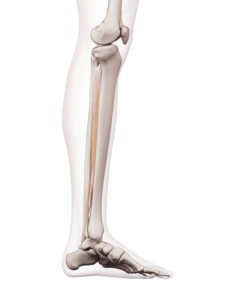Osteoarthritis can occur in any joint, when it occurs at the base of the big toe, or metatarsophalangeal joint, it is called hallux rigidus, or stiff big toe. Osteoarthritis is a degenerative joint disease that develops after years of use. When the smooth cartilage that covers the ends of the bones wears down, it leads to joint pain, stiffness, and swelling. When the bones begin to grind on each other, it can result in constant pain during standing or walking, and loss of mobility.
Symptoms
Hallux rigidus symptoms can include one or more of the following:
- Pain in the joint
- Increased pain with movement, especially when pushing off the big toe
- Swelling
- Difficulty walking
- Bump develops on top of the foot
- Inability to bend the big toe up or down
Diagnosis
Your orthopedic surgeon will examine your foot for swelling, evidence of bone spurs, and test your range of motion. X-rays are taken to provide a detailed picture of your foot to show the level of cartilage degeneration and the size and location of any bone spurs.
Non-surgical treatment
There is no cure for arthritis, but treatments are designed to relieve pain and restore motion. Non-steroidal anti-inflammatories (NSAIDS) and ice can help relieve swelling and help reduce inflammation in the early stages of hallux rigidus. Lifestyle modifications such as wearing a shoe with a larger toe box and getting a stiff soled shoe with a rocker bottom design to reduce motion in the toe joint can also help relieve pain. Corticosteroid injections can also be effective in reducing inflammation and pain.
Surgical treatment options
Fusing the bones together (arthrodesis) is a very reliable treatment to relieve toe pain when the cartilage loss is severe and walking becomes difficult. In this surgical procedure, the bones of the big toe are attached with a plate and screws. In most people the operation is very successful and pain relief is achieved. However, your toes are designed for movement and the range of motion becomes limited. The recovery from this procedure requires a cast for six weeks, followed by using crutches for another six weeks.
When the damage is not as severe, chielectomy (kI-lek’-toe-me) may be recommended. This surgical procedure involves removing the bone spurs and a portion of the foot bone to make more room for the toe to flex. After surgery, the patient will wear a hard-soled sandal for at least two weeks. The toe and incision may remain swollen for several months after the operation.
A newer treatment option is using an implant called Cartiva. In this procedure, the orthopedic surgeon makes a small incision on the top of the toe and removes damaged bone in the toe joint. The gel-like implant is placed into a small hole in the bone and secured with cement or glue. The implant is made of a smooth organic polymer (plastic) that functions similar to cartilage. It provides a smooth, slippery, weight-bearing surface for the joint. Immediately following surgery, your foot will begin bearing weight in order to regain range of motion. The recovery from the implant procedure requires the patient to wear a soft boot for 2-3 weeks. Patients can begin to resume normal activities 5-6 weeks after surgery in normal footwear.
Each treatment option has risks and benefits that you should discuss with your doctor if you have this condition.


